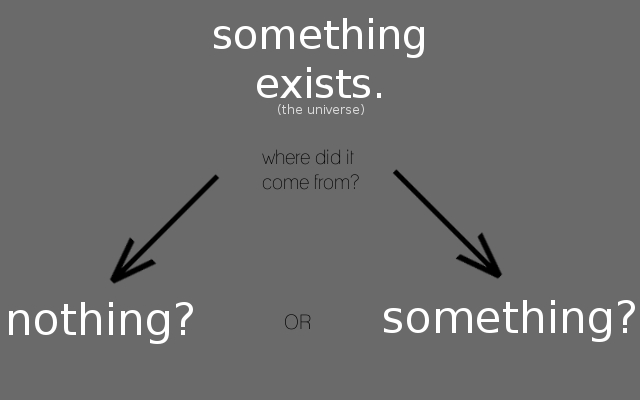What is nothing? It is not what is inside an empty shoebox … that is still something. There is air, dust particles, heat, etc. in there. Nothing is not just a tiny bit of something. Nothing is not any thing. Nothing is no thing.

Last week, in the Truth & Evidences series, we talked about how the material universe had a beginning, and the scientific evidences there are for that. In the past, scientists thought that perhaps the universe was eternal, but as more and more scientific data has come to light, it points more and more to the fact that the universe did, in fact, have a definite beginning. We also talked about that every effect has a cause. What we didn’t really get into very much, though, was the questions that arise from putting the two together: The universe had a beginning, and every effect has a cause. So what was that first cause? What was before the beginning of the universe?
There are, obviously, different ideas that people have to these questions. And it comes back to the question of “nothing” which I mentioned above. Before the universe began, there was no universe. Not just a little bit of the universe, like mathematical points, or a ball of energy or quantum fluxuations … otherwise, that wasn’t the beginning of the universe because whenever THAT piece of the universe came into existence would have been the beginning. For instance even if for argument sake you granted that the Big Bang came from a ball of energy, you still have to explain where that ball of energy came from, what the actual beginning was. So what was before the universe? Nothing? Or something?
What comes from nothing? Nothing comes from nothing. This is simply a fact.
We’ll take a look at the different options. One is to say, “Yeah, I know nothing comes from nothing … but I think in the very beginning there was nothing, and then suddenly there was something. Something came from nothing.” The problems with this are self evident, in that it directly contradicts the known science of causality, yet many have claimed this, even within the scientific community. With quotes like this: Edward P. Tyron, professor of physics Hunter College & CUNY, said, “In 1973, I proposed that our Universe had been created spontaneously from nothing” (New Scientist, vol. 101, 3/8/’84 p. 14) … or Paul C. Davies, in “What hath COBE Wrought?” Sky and Telescope r(Jan. 1993) p.4, “Quantum events do not need well-defined prior causes; they can be regarded as spontaneous fluctuations. It is then possible to imagine the universe coming into being from nothing entirely spontaneously, without violating any laws.”
Often to make this sort of claim, quantum mechanics is brought up. However, to call on this to justify something coming from nothing – there are a number of big problems with what they are trying to do here. The most major problem is this, pointed out by astrophysicist David Darling:
“What is a big deal – the biggest deal of all – is how you get something out of nothing. Don’t let the cosmologists try to kid you on this one. They have got no clue either – despite the fact that they are doing a pretty good job of convincing themselves and others that this is really not a problem. ‘In the beginning,’ they will say there was nothing – no time, space, matter or energy. Then there was a quantum fluctuation from which …’ Whoa! Stop right there. You see what I mean? First there is nothing, then there is something. And the cosmologists try to bridge the two with a quantum flutter, a tremor of uncertainty that sparks it all off. Then they are away before you know it, they have pulled a hundred billion galaxies out of their quantum hats … You cannot fudge this by appealing to quantum mechanics. Either there is nothing to begin with, in which case there is no quantum vacuum, no pre-geometric dust, no time in which anything can happen, no physical laws that can effect a change from nothingness into somethingness; or there is something, in which case that needs explaining.” (“On Creating Something from Nothing,” New Scientist, vol. 151 (Sept. 14, 1996) p.49)
So there’s option 1 – you can claim something came from nothing. It goes against so many basic laws of science, and therefore requires quite a bit of faith, as we’ve talked about before, but there you have it.
Option 2 is that there was something came from something, not something from nothing. But what was this something?
Again, within this we can propose a couple of options. One is the supernatural. That before the universe began, there was nothing physical, nothing of the universe, nothing that can be quantified by science, but that something existed beyond the laws of science (which is the definition of supernatural). That is to say, God. Of course, the first question that gets asked is, “Well, but where did God come from? If every effect has a cause, what was God’s cause?” But the law of causality applies to the physical realm, not to the supernatural realm. By the definition of supernatural, it is not controlled by the laws of nature. (Which is different than breaking the rules of science, it is beyond the rules of science.) God would be the original cause, as eternal, not needing a cause. He would be the one who created science, and the rules of the universe, rather than the other way around. In fact, an astronomer named Robert Jastrow, who was a leading scientist as NASA, and self proclaimed as “an agnostic, and not a believer”, said, “astronomers now find they have painted themselves into a corner because they have proven, by their own methods, that the world began abruptly in an act of creation to which you can trace the seeds of every star, every planet, every living thing in this cosmos and on the earth. And they have found that all this happened as a product of forces they cannot hope to discover. That there are what I or anyone would call supernatural forces at work is now, I think, a scientifically proven fact.”
The other option of something-came-from something is that someone might say, “Well, if you can argue an eternal God, why can’t I argue an eternal ball of energy or other eternal element of the universe?” You could argue that. But if you argue something physical, something bound by the rules of science, then it must follow the rules of science, and the eternal existence of the universe (even some element of it) is simply not what science shows us, as we discussed last week.
The fact is, any of these three options take some faith to hold. We can’t go back and simply watch and see what happened. Option 1 is that something came from nothing. Option 2a is that something came from something, with that something being an eternal supernatural force (God). Option 2b is that something came from something, with that something being an eternal physical force. All three require faith to believe in them. What we have to ask ourselves is this – which is the most reasonable?
To break the laws of science in an attempt to explain it by science (either by nothing becoming something or an eternal element of the universe)
Or to believe in something beyond the laws of science (the existence of God)?
I believe the second is the much more reasonable conclusion. Again, this is not the end all argument to the existence of God. This is but one piece of the puzzle. Also, we haven’t defined at all who and what God is, except that he would have to be eternal. We’ll be looking at both of those (additional arguments of the existence of God as well as who/what he is) in the future.


Great ‘evidence’….!
Thanks Roger. :)